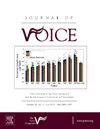Gluten Sensitivity Underlying Resistant “Laryngopharyngeal Reflux” Symptoms and Signs
IF 2.4
4区 医学
Q1 AUDIOLOGY & SPEECH-LANGUAGE PATHOLOGY
引用次数: 0
Abstract
Introduction
Laryngopharyngeal reflux (LPR) is one of the most common conditions encountered in otolaryngology. Gluten sensitivity may mimic the signs and symptoms of LPR or act as an aggravating cofactor with LPR. Gluten sensitivity and food intolerance also have been implicated as conditions that may be associated specifically with LPR symptoms and signs resistant to traditional medical treatment. Medical management of LPR may be insufficient to control symptoms and laryngeal signs of reflux, constituting resistant LPR. Eliminating gluten from the diet could provide symptomatic relief to patients with gluten sensitivity and LPR that is not controlled adequately by current regimens. The purpose of our study was to investigate the relationship between gluten sensitivity and LPR. We aimed to evaluate reflux finding score (RFS) improvement following elimination of gluten from the diet in patients with resistant LPR who had positive blood tests associated with gluten sensitivity. Symptom improvement was also assessed following dietary gluten elimination. Lastly, we aimed to identify predictors for a positive response to a gluten-free diet.
Methods
Adult patients who underwent gluten sensitivity testing for treatment-resistant LPR symptoms and/or signs were included. Patients with ≥1 positive test were advised to begin a therapeutic trial of a gluten-free diet. Subjects who chose not to trial a gluten-free diet or tested negative for gluten sensitivity markers served as controls. RFS was the primary outcome measure.
Results
One hundred ninety-seven patients were included; 81 trialed a gluten-free diet. Subjects who trialed the gluten-free diet were significantly more likely to demonstrate objective improvement in RFS (77.14% vs 43.88%), and report subjective improvement (55.41% vs 25.77%) than those who did not. RFS had decreased significantly from baseline at 1-3, 3-6, 6-12, and >12-month interval follow-up examinations in subjects who trialed a gluten-free diet. Comparison between subjects who trialed the gluten-free diet, tested positive for a gluten sensitivity marker but did not trial the gluten-free diet, and subjects who were negative for all gluten sensitivity markers revealed that a gluten-free diet was associated with a significantly greater percent improvement in RFS compared to controls at 1-3, 6-12, and >12-months.
Conclusion
Gluten sensitivity can mimic or aggravate LPR. A gluten-free diet should be considered for patients with resistant LPR, especially if blood test abnormalities that suggest gluten sensitivity are identified. The diet should be maintained for a minimum of three months to demonstrate objective improvement using RFS.
麸质敏感性的潜在抵抗“咽喉反流”症状和体征
喉咽反流(LPR)是耳鼻喉科最常见的疾病之一。麸质敏感性可能模仿LPR的体征和症状,或作为LPR的加重辅助因素。麸质敏感和食物不耐受也可能与LPR症状和对传统药物治疗有抵抗力的体征特别相关。LPR的医疗管理可能不足以控制反流症状和喉部体征,构成顽固性LPR。从饮食中去除麸质可以为麸质敏感和LPR患者提供症状缓解,目前的方案无法充分控制这些患者。我们研究的目的是探讨麸质敏感性和LPR之间的关系。我们的目的是评估从饮食中消除谷蛋白的耐药LPR患者血液检测阳性与谷蛋白敏感性相关的反流发现评分(RFS)改善情况。在饮食中消除麸质后也评估了症状的改善。最后,我们的目标是确定对无麸质饮食的积极反应的预测因素。方法接受谷蛋白敏感性试验的LPR治疗耐药症状和/或体征的成年患者。≥1阳性试验的患者建议开始无谷蛋白饮食的治疗试验。选择不尝试无麸质饮食或麸质敏感标志物检测阴性的受试者作为对照。RFS是主要结局指标。结果共纳入197例患者;81人尝试无谷蛋白饮食。试验无麸质饮食的受试者比未试验的受试者更有可能在RFS方面表现出客观改善(77.14%对43.88%),并报告主观改善(55.41%对25.77%)。在试验无谷蛋白饮食的受试者中,RFS在1-3、3-6、6-12和12个月的随访检查中从基线显著下降。试验无谷蛋白饮食的受试者,谷蛋白敏感标志物检测呈阳性,但没有试验无谷蛋白饮食,和所有谷蛋白敏感标志物检测呈阴性的受试者之间的比较显示,在1-3个月、6-12个月和12个月时,与对照组相比,无谷蛋白饮食与RFS改善的百分比显著增加。结论麸质敏感性可模拟或加重LPR。耐药LPR患者应考虑无麸质饮食,特别是如果血液检查异常表明麸质敏感。饮食应保持至少三个月,以证明使用RFS客观改善。
本文章由计算机程序翻译,如有差异,请以英文原文为准。
求助全文
约1分钟内获得全文
求助全文
来源期刊

Journal of Voice
医学-耳鼻喉科学
CiteScore
4.00
自引率
13.60%
发文量
395
审稿时长
59 days
期刊介绍:
The Journal of Voice is widely regarded as the world''s premiere journal for voice medicine and research. This peer-reviewed publication is listed in Index Medicus and is indexed by the Institute for Scientific Information. The journal contains articles written by experts throughout the world on all topics in voice sciences, voice medicine and surgery, and speech-language pathologists'' management of voice-related problems. The journal includes clinical articles, clinical research, and laboratory research. Members of the Foundation receive the journal as a benefit of membership.
 求助内容:
求助内容: 应助结果提醒方式:
应助结果提醒方式:


